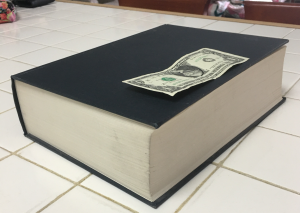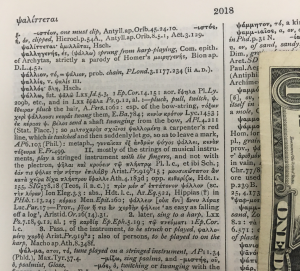There’s a curious word that occurs 74 times in the Psalms and three times in Habbakuk. It’s so problematic that many translations, starting with the King James, don’t even try to translate it, they just transliterate it — phonetically spell it into English: ‘selah’. The meaning of the word is not known, though various interpretations have been given. Prevailing opinion is that it is probably either a liturgical-musical mark — “timeout for a musical interlude”, or an instruction on the reading of the text — “stop and listen.”
Around 300 BCE the Septuagint translators translating the Hebrew Scriptures into Greek had their own take on what ‘selah’ means (ancient scholars for whom Ancient Greek and Hebrew were still living languages), and they settled on translating it as διάψαλμα/DIAPsALMA. You can see the word PsALM embedded in that. (‘ψ/Ps’ is the single Greek letter ‘psi’ for the sound ‘ps’). So, what is one to make of DIAPsALMA?
Well, it’s the preposition DIA (‘through’, mostly) plus PsALMA. In this context, DIA generally intensifies the word to which its connected, so let’s look at PsALMA.
We pause now for an aside…
The grand-daddy of Greek lexicons (near as I can tell, ‘lexicon’ has come to mean a dictionary of a dead language) has to be the Liddell-Scott (see Wikipedia. Available on Amazon! And I’m only talking about the unabridged version.) The Liddell-Scott lexicon covers from Homer (700 BCE?) through the early Christian Fathers (400 CE?) — a span of some 1100 years! There are many fine lexicons of subsets of that: lexicons just for the Septuagint, lexicons just for New Testament Greek, etc. (and I own and use them). But to me the virtue of the Liddell-Scott is that it gives me a sense of what a person on the street in 200 BCE Alexandria reading the Psalms for the first time encountering DIAPsALMA — what would they make of it? So I definitely consult my Septuagint specific lexicons, but I start with Liddell-Scott to give me a sense of the word in the overall context of Ancient Greek.
The lexicon itself is extraordinary. To me it’s too wonderful not to own a paper copy. (I have an eCopy as well.) Here it is:

So let’s look up PsALLŌ:

You can see that this is very dense (fine print!). Not just the small typeface: the user is also expected to learn quite a few abbreviations to use it — so the publisher can keep the size of it down to — wait for it — 2042 pages! One of its great virtues is that it quotes many examples of usage from over a millennium of Greek literature. Here it is:
ψάλλω, fut. ψᾰλῶ LXX Jd. 5.3, 1 Ep.Cor. 14.15: aor. ἔψηλα Pl. Ly. 209b, etc., and in LXX ἔψα̅λα Ps. 9.12, al.:—pluck, pull, twitch, ψ. ἔθειραν pluck the hair, A. Pers. 1062: esp. of the bow-string, τόξων χερὶ ψάλλουσι νευράς twang them, E. Ba. 784; κενὸν κρότον Lyc. 1453 ; ἐκ κέραος ψ. βέλος send a shaft twanging from the bow, APl. 4.211 (Stat. Flacc.); so μιλτοχαρὴς σχοῖνος ψαλλομένη a carpenter’s red line, which is twitched and then suddenly let go, so as to leave a mark, AP 6.103 ( Phil. ): metaph., γυναῖκας ἐξ ἀνδρῶν ψόγος ψάλλει, κενὸν τόξευμα E. Fr. 499.
II mostly of the strings of musical instruments, play a stringed instrument with the fingers, and not with the plectron, ψῆλαι καὶ κρούειν τῷ πλήκτρῳ Pl. l. c., et ibi Sch.; ἐάν τις ψήλας τὴν νήτην ἐπιλάβῃ Arist. Pr. 919b15 ; μουσικώτατος ὢν χατὰ χεῖρα δίχα πλήκτρου ἔψαλλε Ath. 4.183d ; opp. κιθαρίζω, Hdt. 1.155, SIG 578.18 (Teos, ii B.C.); πρὶν μέν σ’ ἑπτάτονον ψάλλον (sc. τὴν λύραν) Ion Eleg. 3.3 : abs., Hdt. l. c., Ar. Eq. 522, Hippias (?) in PHib. 1.13.24; κόραις Men. Epit. 260 ; ψάλλειν [οὐκ ἔνι] ἄνευ λύρας Luc. Par. 17 :—Prov., ῥᾷον ἤ τις ἂν χορδὴν ψήλειε ‘as easy as falling off a log’, Aristid. Or. .31)26(14).31.
2 later, sing to a harp, LXX Ps. 7.18, 9.12, al.; τῇ καρδίᾳ Ep.Eph. 5.19 ; τῷ πνεύματι 1 Ep.Cor. l. c.
3 Pass., of the instrument, to be struck or played, ψαλλομένη χορδή Arist. Pr. 919b2 ; also of persons, to be played to on the harp, Macho ap. Ath. 8.348f.
Liddell & Scott are the publicly presented editors of this (and I’m sure they more than earned that honor), yet behind them who can count the person decades of work it took to create this by unsung men and women dedicated to this vision. And it was created B.C. — Before Computers — collated and typeset by hand!
I am utterly in awe that humans undertake and complete this kind of labor. Obviously not for money — rather for the AGAPĒ of it. For the AGAPĒ they felt for our ancient heritage, including the Greek New Testament. Not to mention the great cloud of scholars who have made Septuagint specific and New Testament specific lexicons, and grammars, and commentaries available to us.
If you wade through the Liddell-Scott entry above, it seems clear that PsALMO initially referred to playing the harp (or at least an instrument plucked with fingers), and additionally PsALMO refers to the harp accompanying singing. Is that what ‘selah’ means? I don’t find any consensus! Does the informed opinion of native Ancient Greek speaking Hebrew scholars around 300 BCE tell us something about DIAPsALMA? Probably! But Mystery stalks ‘selah’ nonetheless. Likely forever.
Since I’ve committed myself to translating the Septuagint Psalms I thought I’d ‘translate’ DIAPsALMA with a musical interlude of my own — click on the link! The interlude is on harp, of course (in keeping with the Greek etymology <grin!>).
Leave a Reply